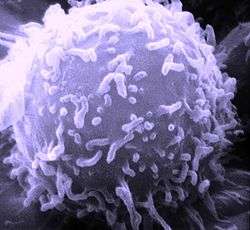Cancer cell



Cancer cells are cells that grow and divide at an unregulated, quick pace. Although cancer cells can be quite common in a person, they are only malignant when the other cells (particularly natural killer cells) fail to recognize and/or destroy them.[1] In the past a common belief was that cancer cells failed to be recognized and destroyed because of a weakness in the immune system. However more recent research has shown that the failure to recognize cancer cells is caused by the lack of particular co-stimulated molecules that aid in the way antigens react with lymphocytes.[2]
Causes
By researching stem cells scientists have suggested that too much SP2 protein may turn stem cells into cancer cells.[3] Other issues thought to play a role in the spread of cancer include viruses, immune system issues, genetics, environment and age.[4] However, a lack of particular co-stimulated molecules that aid in the way antigens react with lymphocytes can impair the natural killer cells ability and ultimately cause cancer.[2]
All cancers begin in cells, the body's basic unit of life. To understand cancer, it's helpful to know what happens when normal cells become cancer cells.
The body is made up of many types of cells. These cells grow and are controlled to produce more cells as they are needed to keep the body healthy. When cells become old or damaged, they die and are replaced with new cells.
Sometimes this process of controlled production of cells goes wrong. The genetic material (DNA) of a cell start producing mutations that affect normal cell growth and division by being damaged. When this happens, sometimes these cells do not die but form a mass of tissue called a tumor. Said mutations accumulate, being another reason that cancer is found more often in older people.
Pathology
White Blood cells are thought to use a dual receptor system when they determine whether or not to kill human cells. If a cell is under stress, turning into tumors, or infected, molecules including MIC-A and MIC-B are produced to put on the surface of the cell.[1] These work to detect and kill cancer cells.[5]
Discovery
Some descriptions of cancer, not all descriptions, go back to ancient Egypt as far back as 1600 BCE and the understanding of cancer was significantly advanced during the Renaissance period. However, Sir Rudolf Virchow, a German biologist and politician, is generally credited with discovering the first cancer cells. As Giovanni Morgagni had linked autopsy findings seen with the unaided eye with the clinical course of illness, so Virchow correlated microscopic pathology.[6]
Telomerase
Cancer cells have unique features that make them "immortal" according to some researchers. The enzyme telomerase is used to extend the cancer cell's life span. While the telomeres of most cells shortens after each division eventually causing the cell to die, telomerase extends the cell's telomeres. This is a major reason that cancer cells can accumulate over time creating tumors.
Cancer stem cells and drug resistance
Scientists have discovered a molecule on the surface of tumors that appears to promote drug resistance—by converting the tumor cells back into a stem cell-like state. When the tumor cells began to exhibit drug resistance, the cells were simultaneously transforming into a stem cell-like state, which made them impervious to the drugs. It appeared that the treatment itself was driving this transformation by activating a specific molecular pathway. Luckily, several existing drugs can attack this pathway and reverse the cellular transformation, thus ‘re-sensitizing’ the tumor to treatment.[7][8][9]
See also
References
- 1 2 "The Innate Immune System: NK Cells". Community College of Baltimore County. Archived from the original on 2010-07-27. Retrieved 2010-12-01.
- 1 2 Creating Cancer Killers. Research.uky.edu. Retrieved on 2010-12-01.
- ↑ Too much SP2 protein turns stem cells into 'evil twin' cancer cells. Sciencedaily.com (2010-10-27). Retrieved on 2010-12-01.
- ↑ What causes cancer? : Cancer Research UK : CancerHelp UK. Cancerhelp.org.uk (2010-07-15). Retrieved on 2010-12-01.
- ↑ The Adaptive Immune System: Ways That Antibodies Help to Defend the Body - Antibody-Dependent Cellular Cytotoxicity (ADCC). Student.ccbcmd.edu. Retrieved on 2010-12-01.
- ↑ History of cancer
- ↑ Cancer stem cells linked to drug resistance
- ↑ Tumor Cells Become Drug Resistant by Reverting to a Stem Cell-Like State
- ↑ Laetitia Seguin, Shumei Kato, Aleksandra Franovic, et al., & David A. Cheresh (2014). An integrin β3–KRAS–RalB complex drives tumour stemness and resistance to EGFR inhibition. Nature Cell Biology doi:10.1038/ncb2953
External links
- BCG strain S4-Jena: An early BCG strain is capable to reduce the proliferation of bladder cancer cells by induction of apoptosis. Ncbi.nlm.nih.gov. Retrieved on 2010-12-01.
- The History of Cancer. Cancer.org. Retrieved on 2010-12-01
| ||||||||||||||||||||||||||||||||||||